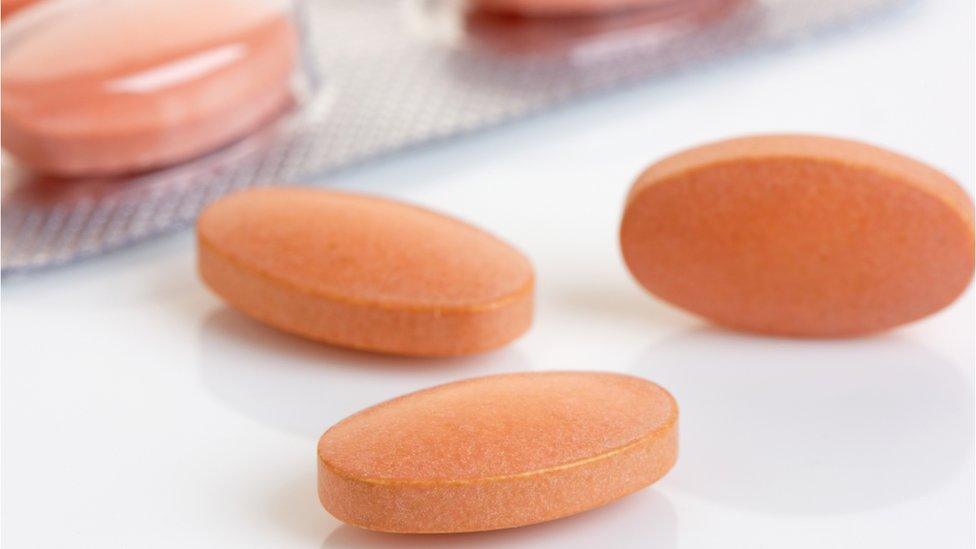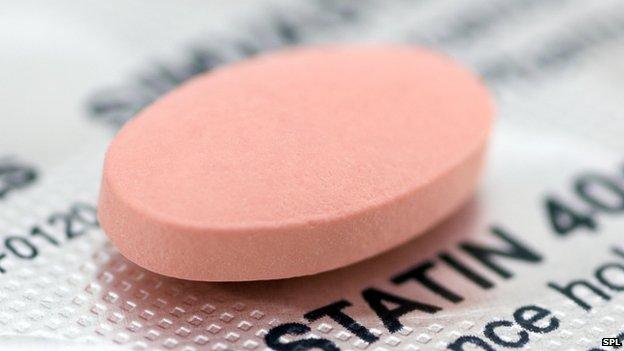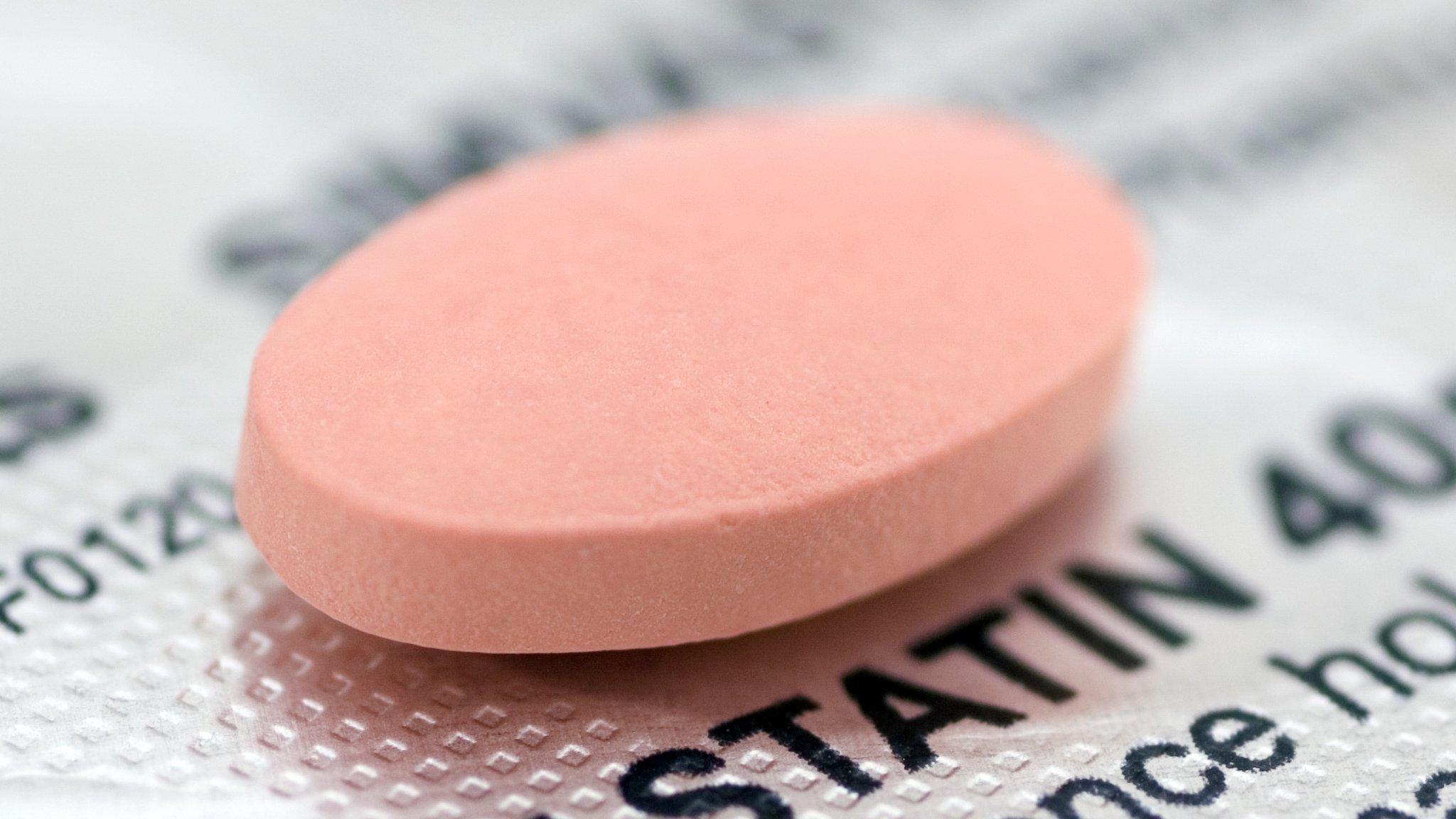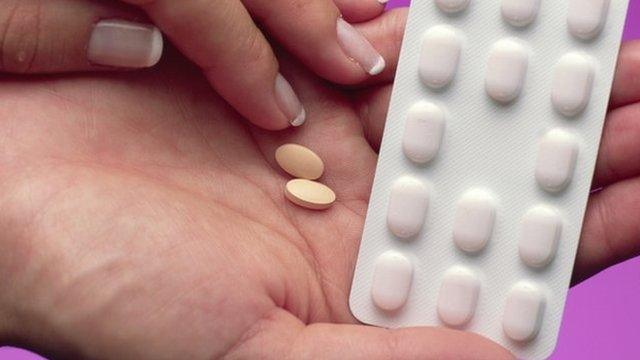Statins benefits underestimated, review says
- Published

The benefits of the cholesterol-reducing drug statins are underestimated and the harms exaggerated, a major review suggests.
Published in the Lancet, external and backed by a number of major health organisations, it says statins lower heart attack and stroke risk.
The review also suggests side effects such as muscle pain do occur, although in relatively few people.
But critics say healthy people are unnecessarily taking medication.
Dummy drug effect
Statins reduce the build-up of fatty plaques that lead to blockages in blood vessels. According to the report authors:
About six million people are currently taking statins in the UK
Of those, two million are on them because they have already had a heart attack, stroke or other cardiovascular event
The remaining four million take statins because of risk factors such as age, blood pressure or diabetes
Up to two million more should possibly take statins
The Lancet review, led by Prof Rory Collins from the Clinical Trial Service Unit at the University of Oxford, looked at the available evidence for the effects of taking an average 40mg daily dose of statins in 10,000 patients over five years.
It suggested cholesterol levels would be lowered enough to prevent 1,000 "major cardiovascular events" such as heart attacks, strokes and coronary artery bypasses in people who had existing vascular disease - and 500 in people who were at risk due to age or other illnesses such as high blood pressure or diabetes.

'It's better than the risk of a heart attack'

Stephen Sangster with his family
Stephen Sangster, who lives in Orpington with his wife and two children explains why he takes the drugs.
"I've been taking statins for three months now. I'm 34. My high cholesterol was picked up by a work health assessment. Dietary changes made no impact.
"With my dad dying of heart attack young last year, statins give me comfort that they will probably give me a longer life. So I can live with the small chance of side effects.
"So far I've only experienced a bit of dizziness, and I don't know even if that's related to statins. Also it's better than the risk of a heart attack.
"My cholesterol was 9.3 and within a month of taking statins it's back down to below four.
"Cholesterol is a hidden danger. It's such a simple test. More people should be encouraged to take it.
"I wonder how many other younger people would benefit from a statin, but don't realise they have an issue. "

The review also said randomised controlled trials - where neither patient nor doctor know who is on the real drug and who is on a dummy version - suggested the average dose led to a relatively low level of side effects.
In the same 10,000 population, there would be some side effects, including between 50 and 100 cases of adverse events such as muscle pain, it said.
Observational studies - where people know they are taking the drug and will have been told of known side effects including muscle pain - had higher rates.
Question marks
Prof Collins said: "Our review shows that the numbers of people who avoid heart attacks and strokes by taking statin therapy are very much larger than the numbers who have side effects with it.
"In addition, whereas most of the side effects can be reversed with no residual effects by stopping the statin, the effects of a heart attack or stroke not being prevented are irreversible and can be devastating.
"Consequently, there is a serious cost to public health from making misleading claims about high side effect rates that inappropriately dissuade people from taking statin therapy despite the proven benefits."
The Royal College of GPs (RCGP) and the British Heart Foundation are among a number of major organisations backing the report.
Dr Maureen Baker, who chairs the RCGP, said: "We hope this research reassures patients that in the majority of cases statins are safe and effective drugs - but in most cases where adverse side effects are seen, these are reversible by stopping taking statins."
Dr June Raine, of medicines watchdog the Medicines and healthcare products Regulatory Agency said: "The benefits of statins are well established and are considered to outweigh the risk of side-effects in the majority of patients.
"Any new significant information on the efficacy or safety of statins will be carefully reviewed and action will be taken if required."
However, critics said the review was not the final word on statins.
Fiona Godlee, editor of the British Medical Journal, said: "This still does not address the calls for a thorough, independent review of the evidence of statins.
"This is especially important in view of the guidance which recommends that large numbers of healthy people should take a tablet every day."
And London cardiologist Dr Assem Malhotra said: "There are serious question marks about the reliability of industry-sponsored studies on the side effects of statins, and essentially that's what this review is.
"And a lot of the scientists involved in the original studies were involved in this review. It is not an independent review."
- Published9 September 2016

- Published18 July 2014

- Published11 June 2014

- Published12 May 2016
